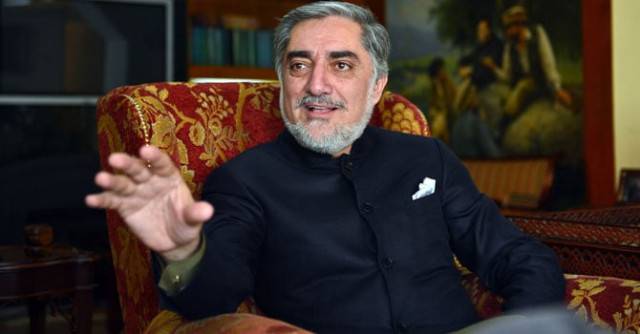Dr Abdullah likely to visit Pakistan this month
FO says Indian will not be allowed to hire foreign lawyer in Jadhav case

Dr Abdulah Abdullah, the head of Afghan High Council for National Reconciliation, is expected to visit Pakistan later this month as part of efforts to seek a peaceful end to the 19-year long war in his country.
Abdullah has been invited by Prime Minister Imran Khan to discuss peace efforts as well as bilateral ties. This will be the first high-level visit from Afghanistan in many months, suggesting a renewed push by the two neighbours to improve their ties.
Although, there is no official announcement, official sources confirmed that Abdullah Abdullah would visit Pakistan in the last week of September. During his visit, he would not only meet the prime minister but the military leadership also, the sources added.
His visit comes at a time when efforts are being made to evolve consensus among Afghan groups, including Taliban, for the future political dispensation. After much delay, the inaugural ceremony of intra-Afghan dialogue was held recently in Doha. However, the formal talks between the Afghan government and Taliban have yet to start.
The latest phase of the Afghan peace process is crucial since it would focus on determining the future political dispensation in Afghanistan. Taliban have sought to adopt Islamic system while other political groups want democratic set up where rights of women and others are guaranteed.
Taliban, however, have shown willingness to accommodate the concerns of other groups as some of their leaders claim that the insurgent group learnt lessons from their past mistakes. The process, nevertheless, will not be easy as some observers believe that Taliban have the upper hand given their military strength and the areas they control at the moment.
FO briefing
Speaking at the weekly briefing, the Foreign Office spokesperson said that at the opening ceremony of intra-Afghan negotiations in Qatar, Foreign Minister Shah Mehmood Qureshi stated that the world had begun acknowledging Pakistan’s position that there was no military solution to the conflict in Afghanistan.
The foreign minister, according to the Spokesperson Zahid Hafeez Chaudhri, also said that Pakistan had fully facilitated the process that culminated in the US-Taliban Peace Agreement in Doha in February 2020 and had reached the critical juncture.
“It was now for the Afghan leaders to seize this historic opportunity, work together constructively, and secure an inclusive, broad-based and comprehensive political settlement, leading to durable peace in Afghanistan,” Chaudhri said.
He added that Pakistan hoped that all sides would honour their respective commitments, persevere in the face of all challenges and setbacks, and remain resolutely committed to achieving a positive outcome. “Pakistan will always support a peaceful, stable, united, democratic, prosperous and sovereign Afghanistan, at peace with itself and with its neighbours.”
Chaudhri told the reporters that Prime Minister Imran Khan would attend the UN General Assembly session through a video link on September 25. He would deliver his address through the video link as this year’s annual session was taking place virtually because of the Covid-19 pandemic.
On Kulbhushan Jadhav case, the spokesperson ruled out allowing India to hire any foreign lawyer to plead his case before the Islamabad High Court (IHC). He made it clear that the Pakistani law only permitted lawyers who were registered with bars, could appear before the local courts.
As part of compliance with the International Court of Justice (ICJ) ruling, the Pakistan government is seeking effective review and reconsideration of the sentence handed down to the Indian spy.
The spokesperson said that Pakistan welcomed the UN High Commissioner for Human Rights, Michelle Bachelete’s reiteration of serious concerns over the unabated state-perpetrated violence in IIOJK, including indiscriminate use of pellet guns on civilians.
The high commissioner’s remarks at the 45th session of Human Rights Council on the global human rights situation, reinforced the serious concerns that had been repeatedly expressed by Pakistan, international media and the global human rights organisations. “Pakistan strongly condemns continued Indian attempts to illegally change the demographic structure of IIOJK,” Chaudhri said.
Reportedly Indian authorities have distributed over 1.68 million domiciles to non-Kashmiris, he added. “The Indian actions are in clear violation of the UN Security Council Resolutions and international law, including the 4th Geneva Convention.”



















COMMENTS
Comments are moderated and generally will be posted if they are on-topic and not abusive.
For more information, please see our Comments FAQ